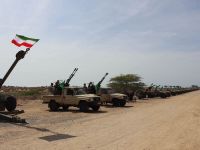The Kuwaiti parliament approved Wednesday, June 27, a 2001-2002 budget which projects a deficit of $5.95 billion amid criticism of the government for failing to carry out much-needed economic reforms.
The budget, approved by a vote of 35 to eight, forecasts expenditures of $17.18 billion and revenues of $12.48 billion. Oil income is projected at $10.63 billion, or 85 percent of the total.
By law, 10 percent of revenues, amounting to $1.25 billion in this case, are deducted for the Kuwait Fund for Future Generations, a $60-billion investment managed by Kuwait Investment Authority.
That $1.25 billion, added to the $4.70 billion difference between revenues and expenditures gives the deficit figure of $5.95 billion.
"This budget does not reflect a government policy for economic reforms. The economy is still suffering from distortions ... This is not a budget for development, it is only for spending," liberal MP Abdulwahab Al-Haroun said.
Oil revenues in the budget were calculated on the basis of a conservative price of $15 a barrel and daily production of about two million barrels. The price of Kuwaiti oil is currently over $22 a barrel.
"Yes, oil revenues have increased, but returns on foreign investments have dropped. A dark future is awaiting us if we do not implement appropriate economic reforms," said opposition MP Mishari Al-Osaimi. "But this depends on political reforms," he added.
Kuwait's fiscal year starts on April 1 and ends March 31. Wages for staff at ministries and other state agencies account for about $10.3 billion, 59.8 percent of total expenditure and 96.8 percent of projected oil revenue.
OPEC member Kuwait provides a cradle-to-grave welfare system for its citizens, with free or heavily subsidized services and no income tax. More than 93 percent of the Kuwaiti workforce of 220,000 are employed by the government.
MPs opposed government plans to impose charges on public services, and insisted that it must instead collect income tax from the rich. They also urged the government to create more jobs for nationals.
Security spending, which includes the defense ministry, is projected at $3.8 billion. Allocations for construction and development projects and other forms of capital expenditure have been increased to $3.74 billion from less than two billion dollars in previous years.
The oil-rich emirate posted a surplus of four billion dollars in the 1999-2000 fiscal year and more than five billion dollars last year, which was shortened to nine months. Economists expect Kuwait to post a surplus for the third year running despite the projected deficit.
International rating agency Fitch IBCA on Tuesday upgraded Kuwait's long-term foreign currency rating from A to A+ and gave a positive outlook for the Gulf state. ― (AFP, Kuwait City)
© Agence France Presse 2001
© 2001 Mena Report (www.menareport.com)







